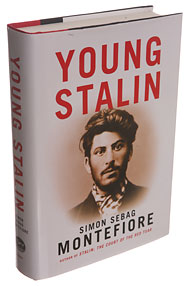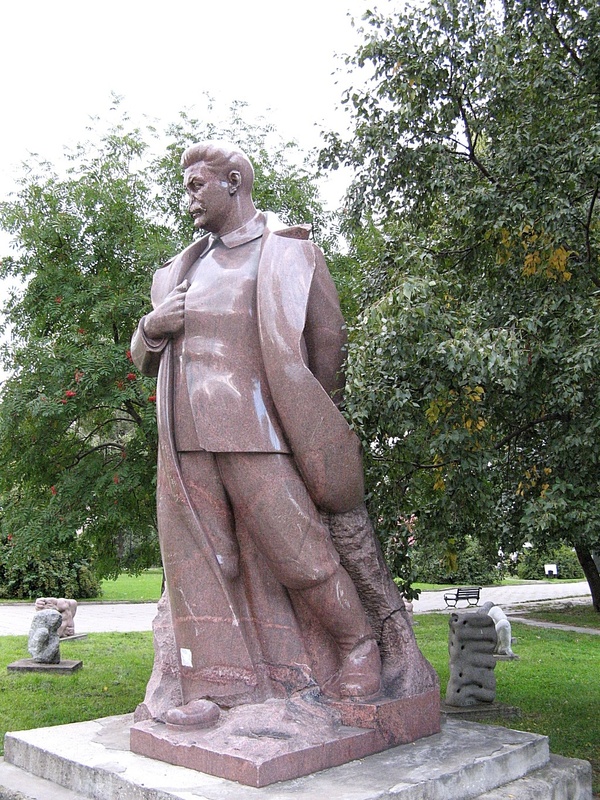Young Stalin, a review

The book |
Having already reviewed two Stalin biographies here and discussed this new book on Svein's blog I decided I wanted to write up a review of Simon Sebag Montefiore's latest book.
What it is
As the title implies, this is a biography of the first part of Stalin's life, from his birth up to the October revolution (1917). Montefiore's book is mainly interesting because it promises to shed new light on a part of Stalin's life that is usually rather sketchily presented in other biographies, and about which not much beyond the broad outline has been known so far. A point of interest here is of course to see if knowledge about Stalin's early life helps explain his murderous dictatorship.
Montefiore says he decided to write the book because of the wealth of new material about the young Stalin he uncovered while doing research in Russia and particularly in Georgia (where Stalin was born and grew up). It's obvious from the start that he has uncovered a huge amount of new material, which has allowed him to write a book that brings the reader much closer to the young Stalin than any previous book has been able to. A crude page count of the content about Stalin 1878-1916 in the various biographies shows that Radzinsky has 75 pages, Robert Conquest 55, the previous Montefiore book 7, and Robert Service probably around 100. By contrast, the new book has 260 pages on this period. So clearly there is more material in the new book than in earlier biographies.
The sources
However, the strength of this book lies in much more than mere length. The book is based to a large extent on letters, memoirs, and diaries written by Stalin's family, friends, enemies, and co-conspirators both at the time and in the 1920s and 30s. Most of this material is new, and it really brings an immediacy to the tale and to the portrait of Stalin which I've never seen equalled before. For the first time, Stalin the person really seems to come alive on the page, and the result is fascinating.
Montefiore discusses his sources quite a bit in the main text, and shows clearly how hard Stalin worked to suppress many of these sources in order to preserve his image as a politician and statesman. Surprisingly, some of the material also comes from investigations conducted by the NKVD/KGB on the politburo's orders after Stalin's death in order to verify or disprove various allegations about Stalin.
New information
These new sources contain much new and surprising information, for example on Stalin the singer. It turns out that Stalin had an excellent voice and for a time actually earned money by singing in weddings, becoming well enough known for people to be drawn to these weddings just to hear him sing. The later steel man and dictator as an angelic boy singer is hard to imagine, but nontheless real.
He also did very well as a poet before giving it up at 17 to become a revolutionary; several of his poems (in Georgian) were published, highly regarded, and even anthologized well before the revolution. Another new piece of information is the picture of Stalin the serial womanizer, a trait Montefiore puts into context by describing Georgia's tradition of male chauvinism and chivalry.

Noseless Stalin statue, Moscow |
Montefiore does an excellent job of describing the Georgia of the late 19th and early 20th century in which Stalin grew up. He describes it as a violent, pre-modern place which did much to form Stalin's character, and shows how Stalin's early career as a revolutionary is easily explained in this context.
His early career was basically that of a gangster, raising money for the bolsheviks by means of robberies, extortion, and blackmail. The high point of this career was the spectacular 1907 Tbilisi gold robbery, with which the biography opens, and which is really the centrepiece of the book. The robbery is described in vivid detail in the book, and in fact this whole section of the book reads much like a gangster novel, although an unusual one set in early 20th century Georgia, where the gangsters give away all their earnings to the communist party.
Weaknesses
For all the strong sides of the book it's not without its flaws as well, and perhaps the worst is that about half-way through the quality of the narrative starts to deteriorate and becomes more disjointed. There's also a huge number of footnotes throughout, and these gradually become annoying, as much of what is in the footnotes really ought to be integrated into the text proper. The last half of the book feels hastily written, as though the writing was never properly completed.
The book focuses mostly on gossip about Stalin and his circle, much like Montefiore's previous book, and is much weaker on the historical context and politics, although these are also covered. There's also a number of weak assertions and inferences throughout, but as Montefiore is always clear on the sources for his statements, this does little real harm to his credibility.
To me quite a few of the transliterations and naming choices in the book were also annoying. Davrishashvili becomes Davrichewy, Dzhugashvili Djugashvili, Lviv is given as Lemberg throughout, and so on.
Conclusion
So, does more information about Stalin's childhood and youth explain the ruthless slaughter of his dictatorship? To some extent I'd grant that it does. Montefiore makes a credible argument for why Stalin's growing up in a place as violent as turn-of-the-20th-century Georgia would give him a certain disregard for the value of human life. This is also borne out by his gangster career, which also had a high cost in human life, something he took with him into the Russian civil war of the 20s. There's also much in Stalin's early life and career that must have contributed to giving him more than a healthy fear of betrayal and spies, which to some extent helps explain the show trials and other abuses.
Still, as with all arguments of this sort, the crimes themselves are so gigantic that any psychological trauma suffered by the perpetrators have to pale almost into invisibility by comparison. Yes, Stalin had a drunken, violent father (vividly described in the book). Yes, he was crushingly poor, betrayed, beaten up, imprisoned, sent into exile, etc etc. Still, why execute 1-2 million people essentially for nothing? Why starve millions of people to death? Why deport entire ethnic nations at immense cost in human lives?
A traumatic upbringing and living in violent times isn't enough of an explanation, and it wasn't seen as such by his contemporaries. So while the biography sheds new light on this question, it can't really be described as fully illuminated yet, and I doubt it will ever be.
Similar posts
Two Stalin biographies
Svein's recent review of Simon Sebag Montefiore's Stalin biography finally made me write up some book reviews I've been planning for a long time
Read | 2007-01-06 23:26
Comments
Svein - 2008-01-07 07:34:32
A very interesting review and it makes me both want to read the book and nevertheless think that i really don't have to do that. I was going to comment on the promising fact that the author managed to restrict the size of the book to 260 pages, but when this is achieved by throwing in a great number of footnotes I think it expresses lack of time more than a sign of quality.
The picture of young Stalin as a promising singer is fascinating and is also followed up (or should I rather say preceded)in "The Red Tsar" biography. Here Montefiore shows Stalin's profound love for music and singing and that he always called for a song whenever gathering friends or being at other parties.
I think Stalin's brutality as dictator also must be seen in light of the party and the system he grew up with and eventually took over. Extreme control and suppression was key factors of establishing the bolsjevism and thus the many questions of Stalin's leadership must be understood in that context. In that way the period of the young Stalin can not shed light on all aspects of his tyranny.
Lars Marius - 2008-01-10 13:36:53
I guess I should add that the book itself is not just 260 pages. The full length is 322 pages. I deliberately left out the year 1917 when comparing the amount of material in different books because 1917 was a year pretty well covered in earlier biographies.
What you say about the general culture of the party is absolutely true, and Montefiore also stresses this. I think you could go further, in fact, and also see this in the light of the general culture of violence of czarist Russia. The history of the revolution, for example, shows that Russia was a very violent place also before the Bolsheviks came into power. So that point is well taken.
John - 2008-05-30 10:20:58
Reviewer says Stalin executed 1 to 2 million people ?? my understanding is that he personally ordered execution of tens of millions. Young Stalin is a fascinating account. I couldn't put it down for long and finished the last 100 pages in one sitting. Item: Putin's gandfather was a chef to Rasputin, Lenin and Stalin !
Lars Marius - 2008-05-30 11:32:39
John: It's an important point here that ordering someone's execution and causing their death is not at all the same thing. So the number of Stalin's victims is much higher than 1-2 million, but that seems a reasonable number for how many people he actually ordered executed.
Wikipedia has more on this: http://en.wikipedia.org/wiki/Stalin#Number_of_victims
John Molnar - 2009-10-11 21:13:09
Very interesting book. It was the time to write it someone. But I am not sure about sources. Another historians sholud be check it (for example on the first chapter has written that mother of Stalin could not write, but she left memoirs???? But it is good book, we can learn a lot of things not only from Stalin but from Lenin, Trockij, Zinoviev etc...
Kiki - 2022-09-09 00:44:11
Muy buenos estos artículos no los tenia en tu blog. Pero te recomendaría varios libros de León Davidovich Bronstein quien nunca le tuvo miedo a Stalin fue contemporáneo y ademas lo denunció desde un principio. Desde que lo deporto al el hasta terminar en México asesinado por un sicario justamente cuando estaba escribiendo un librito sobre Stalin " Los Gangsters de Stalin ", y mascaraba a toda la oposición de izquierda del partido bolchevique en siberia. Stalin podrá haber sido el triunfador sobre el nazismo, pero el era un facho de izquierda del socialismo en un solo pais, y el termidor de la revolución mas grande de todos los tiempos. Que enseño que la clase obrera podía manejar los asuntos de la sociedad son los capitalistas, que hoy mas que nunca demuestran que no son dignos de manejar los asuntos de la naturaleza y las relaciones humanas. Incluso ni León ni Illich pudieron imaginar lo que semejante monstruo podía degenerar dentro de su imperio del terror. Incluso te recomiendo la lectura, querido Lars del libro de Pierre Broué sobre el partido Bolchevique. Encontraras un critica y cronología mas fiel a el verdadero Stalin. Saludos y un gusto leerte siempre Lars. Salú/skol🍻🐝